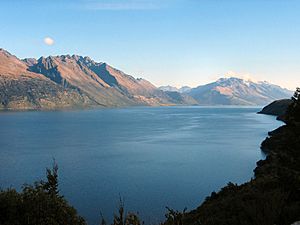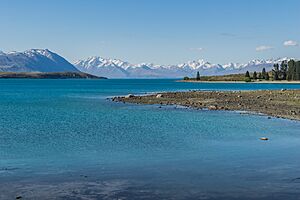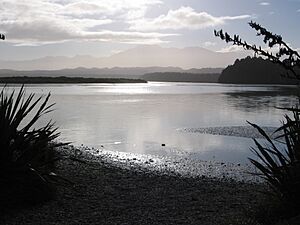List of lakes of New Zealand facts for kids
New Zealand is a country known for its amazing natural beauty, and one of its coolest features is its many lakes! These lakes come in all shapes and sizes, from huge ones you can sail on to tiny hidden ponds. They are found all over the country, from the top of the North Island to the very bottom of the South Island, and even on some smaller islands far away.
Did you know there are:
- 43 lakes bigger than 10 square kilometers (that's like 1000 rugby fields!)
- 231 lakes larger than 0.5 square kilometers
- 3822 lakes bigger than 0.01 square kilometers
That's a lot of lakes to explore!
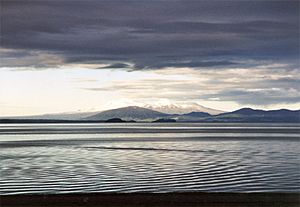
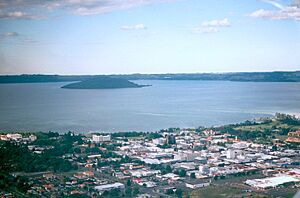
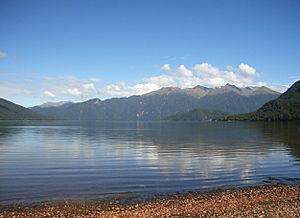
New Zealand's Biggest Lakes
Here are the largest lakes in New Zealand, measured by how much space they cover. You'll see some really famous ones on this list!
| Rank | Name | Size (square kilometers) | Region | Cool Facts |
|---|---|---|---|---|
| 1 | Lake Taupō | 616 | Waikato | New Zealand's biggest lake; second-largest freshwater lake in Oceania |
| 2 | Lake Te Anau | 344 | Southland | The largest lake in the South Island |
| 3 | Lake Wakatipu | 291 | Otago | New Zealand's longest lake (80 km long!) |
| 4 | Lake Wānaka | 192 | Otago | |
| 5= | Lake Ellesmere / Te Waihora | 180 | Canterbury | The largest lagoon (a shallow lake connected to the sea) on mainland New Zealand |
| 5= | Te Whanga Lagoon | 180 | Chatham Island | The largest lake outside the North Island and South Island |
| 7 | Lake Pukaki | 179 | Canterbury | |
| 8 | Lake Manapouri | 142 | Southland | Home to Pomona Island, the biggest inland island in New Zealand |
| 9 | Lake Hāwea | 141 | Otago | |
| 10 | Lake Tekapo | 83 | Canterbury | |
| 11 | Lake Rotorua / Te Rotorua nui ā Kahumatamomoe | 79 | Bay of Plenty | |
| 12 | Lake Wairarapa | 78 | Wellington | |
| 13 | Lake Benmore | 75 | Canterbury/Otago | New Zealand's largest man-made lake |
| 14 | Lake Hauroko | 63 | Southland | New Zealand's deepest lake |
| 15 | Lake Ōhau | 63 | Canterbury | |
| 16 | Lake Waikaremoana | 54 | Hawke's Bay | |
| 17 | Lake Coleridge | 47 | Canterbury | |
| 18 | Lake Poteriteri | 43 | Southland | The largest lake in New Zealand you can't reach by road |
| 19 | Lake Brunner / Moana | 40 | West Coast | |
| 20 | Lake Tarawera | 39 | Bay of Plenty |
New Zealand's Deepest Lakes
These lakes are super deep! Imagine how much water they hold.
- Lake Hauroko: 462 meters deep (that's taller than the Empire State Building!)
- Lake Manapouri: 444 meters deep
- Lake Te Anau: 425 meters deep
- Lake Wakatipu: 420 meters deep
- Lake Hāwea: 392 meters deep
- Lake Wānaka: about 311 meters deep
All these super deep lakes are in the South Island. The deepest lake in the North Island is Lake Waikaremoana, which is 256 meters deep.
Lakes of the North Island
The North Island has many different types of lakes, from volcanic crater lakes to man-made reservoirs and peat lakes.
Northland Region Lakes
Northland is at the very top of New Zealand and has many small lakes, especially on its peninsulas. Many of these are dune lakes, formed in hollows between sand dunes.
- Lake Ōmāpere: This is one of the larger lakes in Northland, covering 14 square kilometers. It's quite shallow, only about 3 meters deep.
- Other lakes include Lake Ngatu, Lake Taharoa, and many smaller ones like Lake Kaiiwi and Lake Humuhumu.
Auckland Region Lakes
The Auckland region has a mix of natural and man-made lakes. Many of the lakes here are reservoirs, which are artificial lakes built to store water for cities like Auckland.
- Lake Pupuke: This is a cool crater lake in Takapuna, formed in the cone of an old volcano.
- Many reservoirs like Cosseys Reservoir and Lower Nihotupu Reservoir are found in the hilly areas, providing drinking water.
- There are also dune lakes like Lake Rototoa on the coast.
Waikato Region Lakes
The Waikato region is home to New Zealand's largest lake, Lake Taupō, and many other interesting lakes, including several formed by hydroelectric dams on the Waikato River.
- Lake Taupō: This huge lake is a giant volcanic crater that filled with water after a massive eruption long ago. It's a popular spot for fishing and water sports.
- Many lakes in this region, like Lake Karapiro and Lake Ohakuri, are hydroelectric reservoirs. This means they were created by building dams on rivers to generate electricity.
- Some unique lakes include Lake Disappear, which sometimes drains away through a sinkhole, and peat lakes like Lake Ngaroto, formed in boggy areas.
Bay of Plenty Region Lakes
This region is famous for its geothermal activity, which has created some unique lakes.
- Lake Rotorua: A large volcanic lake known for its geothermal features and Mokoia Island in the middle.
- Lake Tarawera: Another significant volcanic lake, known for its beautiful scenery and the historic eruption of Mount Tarawera.
- You can also find interesting geothermal lakes like Frying Pan Lake and Inferno Crater Lake in the Waimangu Volcanic Rift Valley.
Gisborne Region Lakes
The Gisborne region has several lakes, often found in valleys or near the coast.
- Tiniroto Lakes: A group of lakes located between Gisborne and Wairoa.
- Wherowhero Lagoon: A coastal lagoon near Poverty Bay.
Hawke's Bay Region Lakes
Hawke's Bay has a variety of lakes, including some significant ones.
- Lake Waikaremoana: This is a large and beautiful lake, the deepest in the North Island. It's surrounded by native forest and is a popular spot for hiking and kayaking.
- Lake Tūtira: A notable lake north of Napier, important for its wildlife.
- Many smaller lagoons and lakes are found throughout the region, some of which are important for birdlife.
Taranaki Region Lakes
Taranaki's lakes are often found near the coast or in the shadow of Mount Taranaki.
- Lake Rotorangi: This is a large man-made lake, created by a hydroelectric dam on the Pātea River.
- Lake Rotokare: A beautiful and protected lake, known for its amazing wildlife sanctuary.
- Smaller lakes like Lake Dive are found high up in Egmont National Park.
Manawatū-Whanganui Region Lakes
This region features lakes in various landscapes, from coastal dunes to volcanic areas.
- Crater Lake: Located on Mount Ruapehu, this is a volcanic crater lake that can be very cold!
- Lake Horowhenua: A significant lake near Levin, important for local culture and environment.
- Many smaller dune lakes are found along the coast, like Kaitoke Lake.
- Several hydroelectric lakes like Lake Moawhango are used for power generation.
Wellington Region Lakes
Wellington, at the bottom of the North Island, has some important lakes, including a very large lagoon.
- Lake Wairarapa: This is a very large, shallow lake or lagoon, important for its wetlands and birdlife.
- Lake Onoke: A lagoon at the mouth of the Ruamahanga River, connected to Lake Wairarapa.
- Smaller lakes and ponds are found throughout the region, some of which are reservoirs for water supply.
Lakes of the South Island
The South Island is famous for its stunning, deep, glacial lakes, especially in the Otago and Southland regions.
Tasman Region Lakes
The Tasman region in the northwest of the South Island has a mix of mountain lakes and coastal lagoons.
- Blue Lake: This lake is famous for having the clearest freshwater in the world! You can see incredibly far underwater.
- Lake Rotoroa and Lake Rotoiti: These are two large, beautiful lakes in Nelson Lakes National Park, popular for boating and hiking.
- Many smaller mountain lakes, called tarns, are found in the national parks, like Lake Angelus.
Nelson Region Lakes
The Nelson region has fewer large lakes but includes some important reservoirs.
- Maitai Dam: A reservoir that provides water for the city of Nelson.
Marlborough Region Lakes
Marlborough, known for its vineyards, also has some interesting lakes and lagoons.
- Lake Grassmere/Kapara Te Hau: This is a shallow lagoon used for producing salt!
- Big Lagoon: A coastal lagoon near the mouth of the Wairau River.
- Mountain lakes like Lake Chalice are found in the higher areas.
West Coast Region Lakes
The West Coast is a rugged region with many lakes, often surrounded by dense native forest.
- Lake Brunner / Moana: The largest lake on the West Coast, popular for fishing and recreation.
- Lake Kaniere: A beautiful lake near Hokitika, used for hydroelectric power.
- Lake Matheson: Famous for its stunning reflections of Aoraki / Mount Cook and Mount Tasman.
- Ōkārito Lagoon: New Zealand's largest unmodified wetland, home to many birds, including the rare white heron.
- Many other lakes, some formed by glaciers, are scattered throughout the region.
Canterbury Region Lakes
Canterbury is a large region with a wide variety of lakes, from vast glacial lakes to coastal lagoons.
- Lake Pukaki, Lake Tekapo, and Lake Ōhau: These are three large, stunning glacial lakes in the Mackenzie Basin, famous for their bright turquoise color from glacial meltwater. They are also part of a major hydroelectric power scheme.
- Lake Ellesmere / Te Waihora: A very large, shallow lagoon near Christchurch, important for its birdlife and cultural significance.
- Lake Coleridge: An important hydroelectric lake in the foothills of the Southern Alps.
- Many smaller lakes and tarns are found in the mountains and along the coast.
Otago Region Lakes
Otago is home to some of New Zealand's most iconic and beautiful lakes, many of which are long and deep, carved by ancient glaciers.
- Lake Wakatipu and Lake Wānaka: These are two of the largest and most famous lakes, popular for tourism, water sports, and stunning scenery.
- Lake Hāwea: Another large glacial lake, often paired with Lake Wānaka.
- Lake Dunstan and Lake Roxburgh: These are man-made lakes formed by dams on the Clutha River for hydroelectric power.
- Sutton Salt Lake: New Zealand's only inland salt lake, a unique natural feature.
Southland Region Lakes
Southland, especially its Fiordland National Park, is known for its incredibly deep and pristine lakes, often surrounded by dramatic mountains and rainforests.
- Lake Te Anau: The largest lake in the South Island and the second largest in New Zealand. It's a gateway to Fiordland and the Milford Track.
- Lake Manapouri: Another large and deep lake in Fiordland, known for its many islands and the Manapouri Power Station.
- Lake Hauroko: New Zealand's deepest lake, a true natural wonder.
- Many other beautiful and remote lakes are found in Fiordland, like Lake Ada along the Milford Track, and Mirror Lakes, famous for their reflections.
Lakes on Other Islands
New Zealand's territory includes many smaller islands, and some of them also have lakes!
Auckland Islands Lakes
The Auckland Islands are a remote group of islands south of New Zealand.
- Lake Hinemoa: A lake in the northern part of Auckland Island, formed in a valley carved by glaciers.
- Lake Turbott: Found on Adams Island, another glacial lake.
Campbell Island Lakes
Campbell Island is another subantarctic island.
- Six Foot Lake: A small lake on the southern coast of Campbell Island.
Chatham Islands Lakes
The Chatham Islands are east of New Zealand and have many lakes, often formed in interesting ways.
- Te Whanga Lagoon: This is the biggest lake in the Chatham Islands, covering a huge part of the main island. It's a large, shallow lagoon.
- Many other lakes here are either lagoons or peat lakes, which form in boggy, marshy areas.
Cook Islands Lakes
The Cook Islands are a group of islands in the Pacific Ocean, part of New Zealand.
- Lake Tiriara on Mangaia and Lake Tiroto on Atiu Island are examples of lakes found on these tropical islands.
Kermadec Islands Lakes
The Kermadec Islands are a remote group of volcanic islands north of New Zealand.
- Blue Lake and Green Lake: These are both crater lakes on Raoul Island, formed in volcanic craters.
Ross Dependency Lakes
New Zealand also claims a part of Antarctica called the Ross Dependency, which has some very unique lakes! These lakes are often covered in ice and are found in the McMurdo Dry Valleys, one of the driest places on Earth.
- Lake Bonney and Lake Fryxell: These are endorheic lakes, meaning water flows into them but not out, so they are often very salty.
- Don Juan Pond: This is an incredibly salty lake, so salty it rarely freezes, even in Antarctica!
- Mount Erebus Lava Lake: A very rare and active lava lake inside the crater of Mount Erebus, one of the few in the world.
 | Emma Amos |
 | Edward Mitchell Bannister |
 | Larry D. Alexander |
 | Ernie Barnes |


